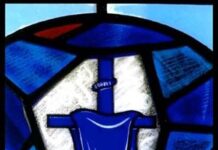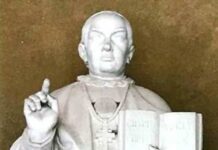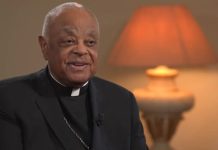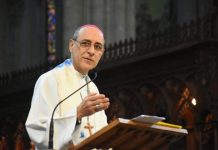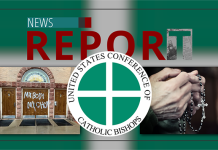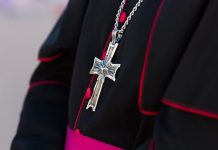Bätzing said: “Just to once again confirm: The form of celebration proposed is not about intercommunion in the sense of a general reciprocal invitation to participate in the Eucharist and Lord’s Supper, but about the question of how we deal with the personal decisions of conscience of individual Catholic or Protestant Christians.”
“For me, I respect such a decision and give Communion when someone asks to receive [the Body of Christ] who believes what we Catholics believe and wants to faithfully receive the Body of the Lord in the Real Presence of Jesus Christ.”
He continued: “It is not about inviting non-Catholic Christians to Communion in general, because there is still no full communion between the separate churches.”
“Catholic canon law also recognizes the possibility that non-Catholics can receive Holy Communion under certain conditions. There is no doubt, however, that we must continue the theological dialogue on the meaning of the Eucharist and the Lord’s Supper and their meaning for church communion.”
CNA Deutsch, CNA’s German-language news partner, reported that Bätzing added that the German Catholic Church’s contentious “Synodal Way” would have an impact on ecumenical ties, though it is primarily about “an internal reform of the Catholic Church in our country.”
Bätzing wrote a letter to clergy in his Diocese of Limburg in March, advising them to give Holy Communion to non-Catholic individuals only if they requested it after examining their consciences.
In the four-page letter issued in light of the Ecumenical Church Congress, he told priests that there could be “no general, inter-denominational reception of the Eucharist” or “new forms of Eucharistic celebration.”
He wrote: “The prerequisite for a worthy reception of the Eucharistic gifts, for both Catholics and non-Catholics, is the examination of one’s conscience.”
“As pastors, we respect the decision of conscience when someone receives Holy Communion after serious examination and in accordance with the Catholic faith.”
He issued the letter amid debate over the proposed “Eucharistic meal fellowship” between Catholics and Protestants in Germany.
The proposal was made by the Ecumenical Study Group of Protestant and Catholic Theologians (known by its German initials, ÖAK) in a 2019 document entitled “Together at the Lord’s Table.”
The ÖAK adopted the text under the co-chairmanship of Bätzing and the retired Lutheran Bishop Martin Hein.
(Story continues below)
Subscribe to our daily newsletter
At Catholic News Agency, our team is committed to reporting the truth with courage, integrity, and fidelity to our faith. We provide news about the Church and the world, as seen through the teachings of the Catholic Church. When you subscribe to the CNA UPDATE, we’ll send you a daily email with links to the news you need and, occasionally, breaking news.
As part of this free service you may receive occasional offers from us at EWTN News and EWTN. We won’t rent or sell your information, and you can unsubscribe at any time.
The study group, founded in 1946, is independent of both the German Catholic bishops’ conference and the Evangelical Church in Germany (EKD), an organization representing 20 Protestant groups. But the ÖAK informs both bodies about its deliberations.
The ÖAK document raised alarm at the Vatican, prompting an intervention by the Congregation for the Doctrine of the Faith (CDF) in September 2020.
In a four-page critique and a letter to Bätzing, the doctrinal congregation emphasized that significant differences in understanding of the Eucharist and ministry remain between Protestants and Catholics.
“The doctrinal differences are still so important that they currently rule out reciprocal participation in the Lord’s Supper and the Eucharist,” it said.
“The document cannot, therefore, serve as a guide for an individual decision of conscience about approaching the Eucharist.”
The CDF cautioned against any steps towards intercommunion between Catholics and members of the EKD.




